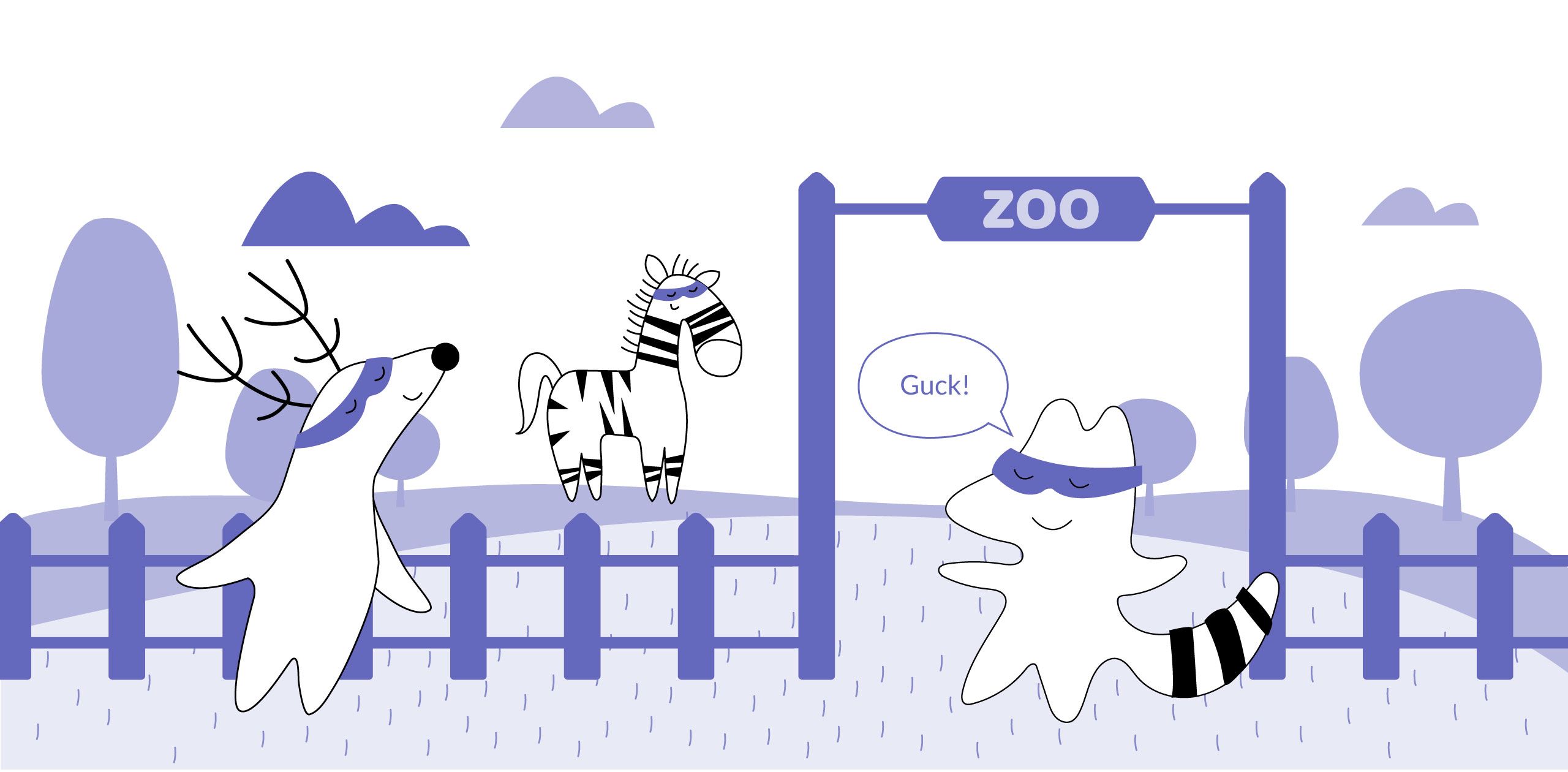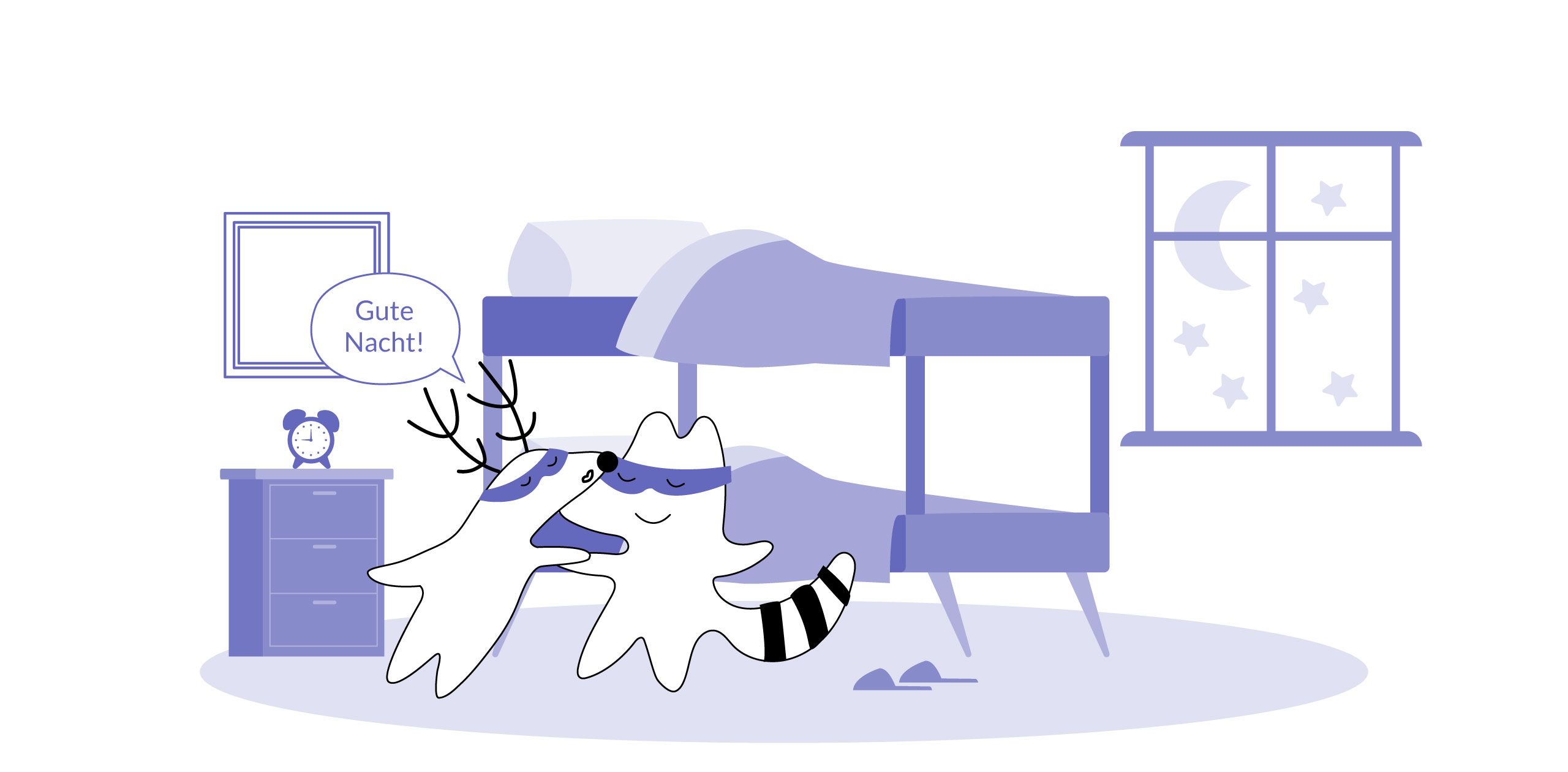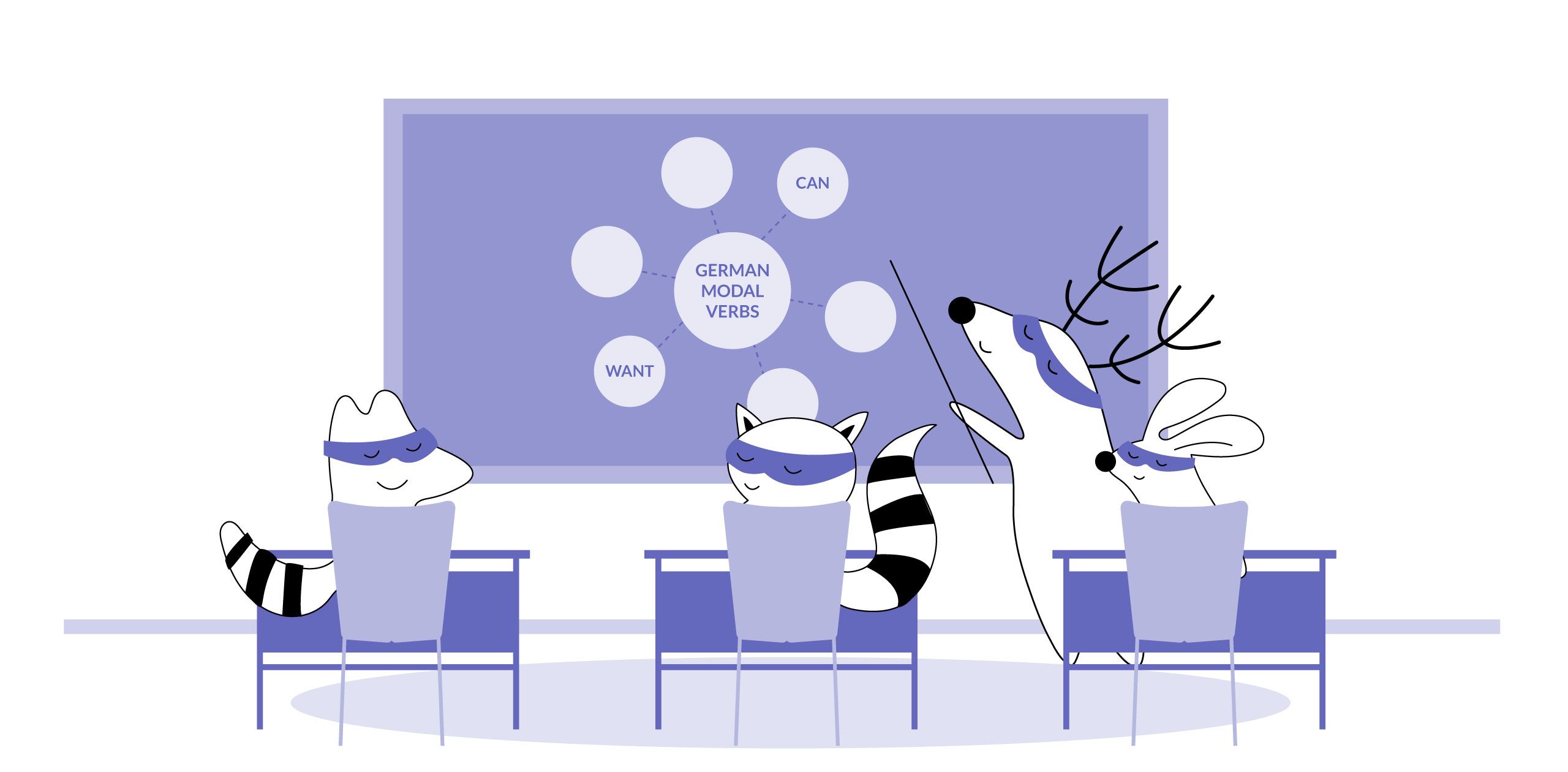
What do you know about modal verbs? You probably don't know what to do with this term in your native language. You probably first heard it when you started learning a foreign language.
Modal verbs are usually presented in a group as some kind of auxiliary verbs. Even though many people are unaware of their meaning and grammatical role in a sentence, they still use modal verbs daily - "Can you relate?"
Modal verbs express actions based on necessity, obligation, possibility, ability, or intent. That is why they are usually combined with other verbs. There are six modal verbs in German that you must be familiar with.
When you study those six German modal verbs, you will be able to construct a variety of phrases in German. Because they are all irregular verbs, they may be difficult to remember at first, but once you have memorized them, many doors will open in the German language.
This post will explain what function modal verbs have in German and how to use them. As a result, you'll soon be able to express your needs and thoughts in German. Read on!
Learn German with Langster
The Six German Modal Verbs
In German grammar, there are six modal verbs. They are usually used in conjunction with other verbs, but they can also be the sole verb in a sentence. Before we continue, let's take a look at the modal verbs and their meanings:
| können | to be able to/can |
| dürfen | to be allowed to/may |
| müssen | to have to/must |
| wollen | to want to |
| sollen | to ought to/should |
| mögen | to like/may |
| können | to be able to/can |
| dürfen | to be allowed to/may |
| müssen | to have to/must |
| wollen | to want to |
| sollen | to ought to/should |
| mögen | to like/may |
You might already know one or two verbs of the list because the modal verbs are in widespread use. For example, when you express your needs, thoughts, or obligations through them, you use modal verbs to say that.
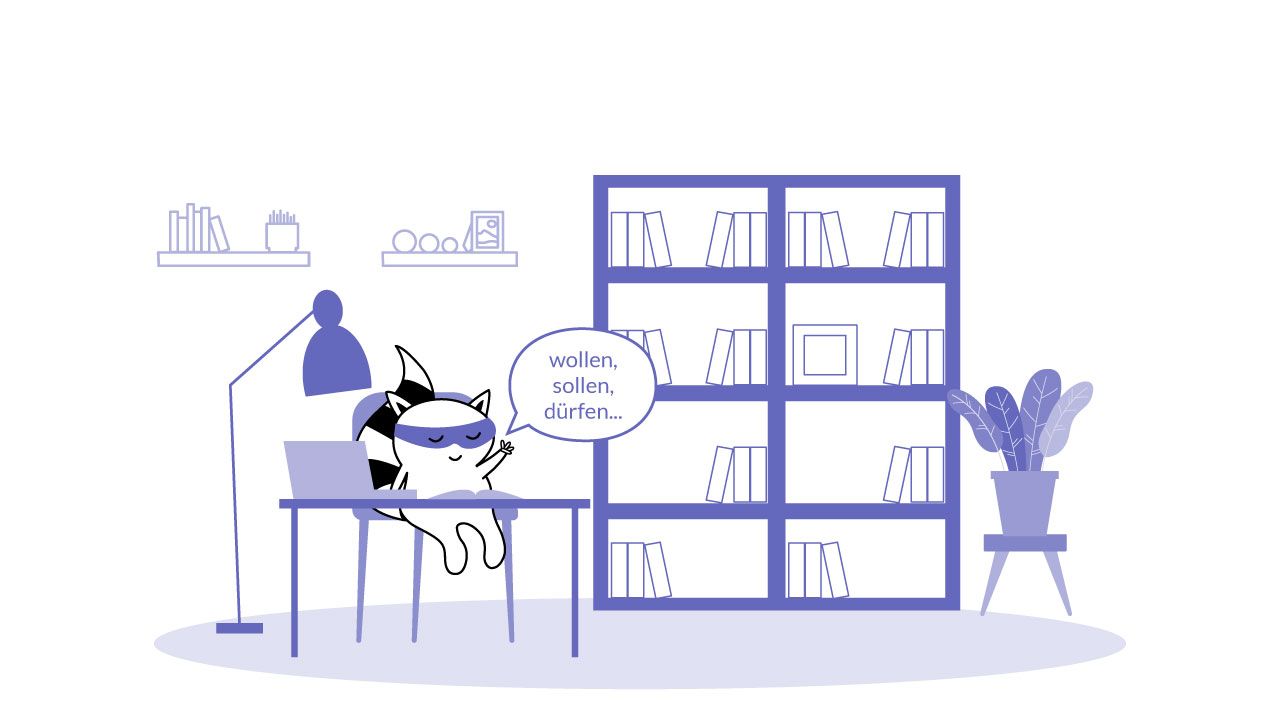
A Modal Verb Comes with Another Verb
Usually, you combine a German modal verb with another German verb in a sentence. It can be considered an auxiliary verb (helping verb), but it actually defines the action of the other verb. Look at the examples:
German
English
Sie kann Deutsch sprechen.
She can speak German.
Ich muss nach Hause gehen.
I must go home.
You see that the phrases have different meanings. The modal verbs "können" (can) and "müssen" (must) help the other German verbs "gehen" (go) and "sprechen" (speak) to be expressed differently.
Sentences with modal verbs are not actions but expressions of personal abilities or thoughts. Without the helping verb "müssen" (must), the example phrase would have a different meaning, as you see:
German
English
Ich gehe nach Hause.
I’m going home.
In this sentence, the action is happening already, while in the same sentence with the modal verb, the action did not happen yet, but the obligation to do it (go home) was expressed.
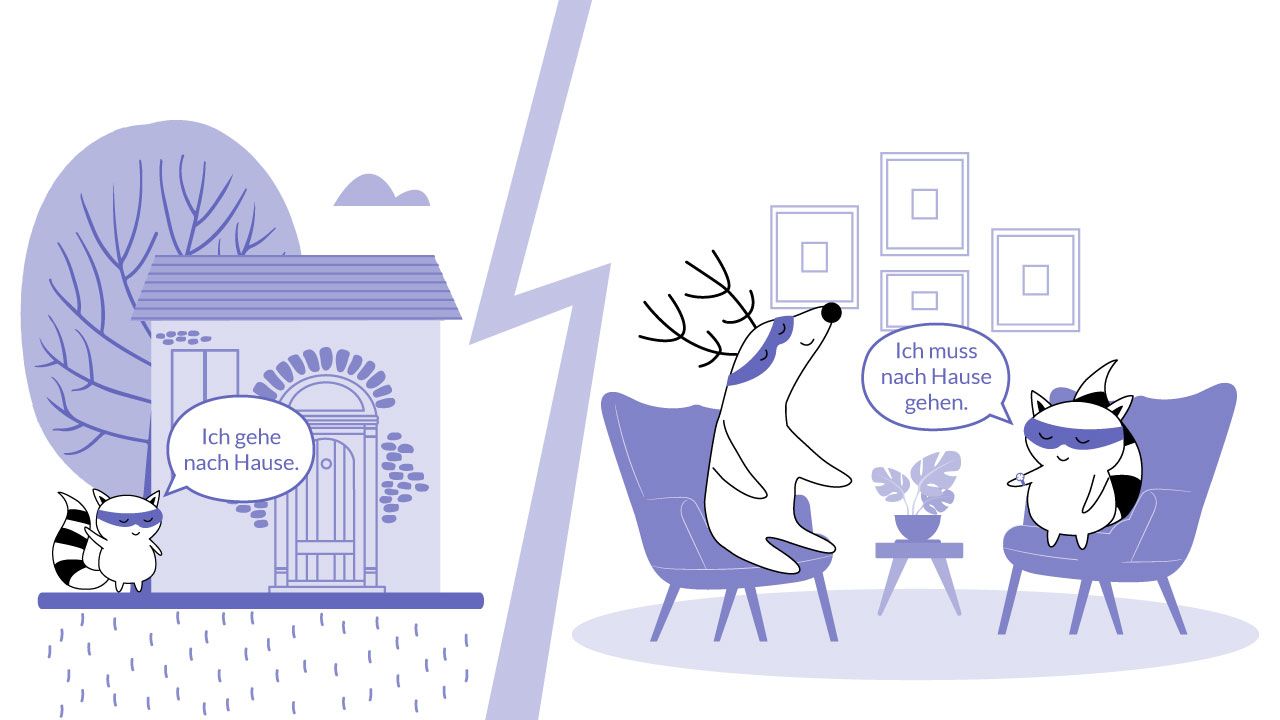
Sentence Order With Modal Verbs
As the modal verb defines the context of the sentence, it is the main verb of the sentence and requires conjugation. The other verb stays in its infinitive form at the very end of the sentence:
German
English
Du kannst Deutsch sprechen.
You can speak German.
If you want to use two German modal verbs in one sentence, the main modal verb will be conjugated and the other two verbs will be in their infinitive form. Let us show you an example:
German
English
Ich will Auto fahren dürfen.
I want to be allowed to drive a car.
First, we have the conjugated main modal verb "will" and then the other two German verbs in their infinitive form at the end of the sentence. It doesn't matter that one of the two verbs is a modal verb; as a secondary verb, it follows the same rules as the action verb.
The infinitive of the modal verb will always stand at the very end of the sentence, behind the other verb in the infinitive form.
Conjugation of German Modal Verbs
We already mentioned that the German modal verb is the sentence's main verb and must be conjugated. Because modal verbs are irregular verbs in German, there is no general conjugation pattern to remember these unique forms. You need to learn them by heart.
However, let us show you the present tense conjugations of "müssen" (to have to), "mögen" (to like), and "wollen" (to want to) to get a general idea how they work:
müssen (to have to)
| ich muss | wir müssen |
| du musst | ihr müsst |
| er, sie, es muss | sie müssen |
| ich muss | wir müssen |
| du musst | ihr müsst |
| er, sie, es muss | sie müssen |
mögen (to like)
| ich mag | wir mögen |
| du magst | ihr mögt |
| er, sie, es mag\t | sie mögen |
| ich mag | wir mögen |
| du magst | ihr mögt |
| er, sie, es mag\t | sie mögen |
wollen (to want to)
| ich will | wir wollen |
| du willst | ihr wollt |
| er, sie, es will | sie wollen |
| ich will | wir wollen |
| du willst | ihr wollt |
| er, sie, es will | sie wollen |
You see that you can apply more or less the conjugation pattern we know from regular German verbs (-e,-st,-t,-en,-t,-en). The plural forms follow the standard pattern.
That means that you can take the verb's infinitive and erase the suffix -en. In the case of "wollen," you take away the -en and stay with "woll-", to which you can add the regular plural endings -en, -t, -en.
That doesn't work for the singular forms of the modal verbs, as most of them change their vowel, like in "will." As a result, you have to study the irregular first-person singular of each verb.
Luckily, the first and third-person singular conjugations are the same, and the second-person singular has the regular -st ending, so you just have to memorize the irregular first-person singular form. We will show you each of them in the present tense to have an overview:
- müssen - ich muss
- sollen - ich soll
- können - ich kann
- dürfen - ich darf
- wollen - ich will
- mögen - ich mag
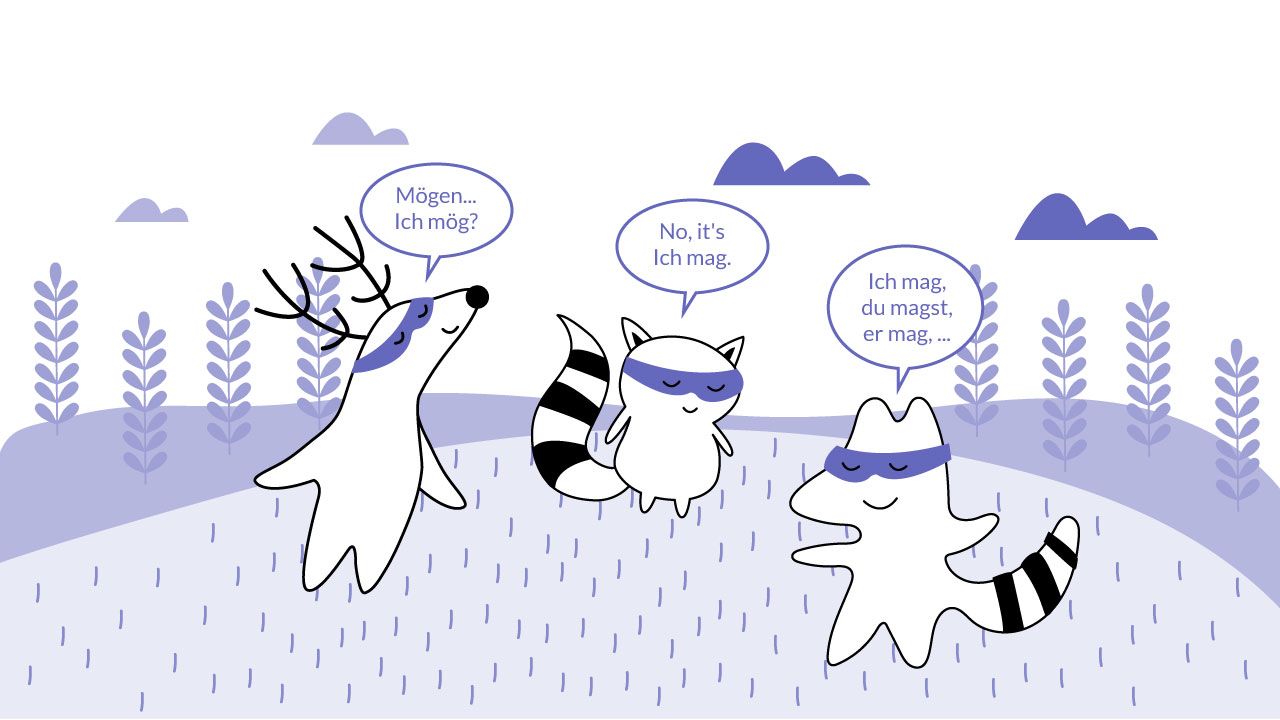
German Modal Verbs in Past Tenses
Conjugating modal verbs in past German tenses is more complicated than in the present tense. The simple past forms of some modal verbs are again irregular and different from what you learned about other verbs in the simple past.
The good thing is that you almost always can use the simple past tense with modal verbs and don't need to study how to express them in other past tenses like present perfect or past perfect.
The Simple Past
In general, the verbs "müssen" (to have to) and "sollen" (to ought to) follow more or less the regular rules of the simple past tense in German. To the first-person singular "muss" or "soll," you add a -te, which then stays for all other persons. For example, the past conjugation of "müssen" looks like this:
| ich musste | wir mussten |
| du musstest | ihr musstet |
| er, sie, es musste\t | sie mussten |
| ich musste | wir mussten |
| du musstest | ihr musstet |
| er, sie, es musste\t | sie mussten |
As you can see, after adding the characteristic -te, the rest of the forms follow the standard pattern (-e, -st, -e, -en, -t, -en). It would be the same for "sollen," like Ich sollte, du solltest, etc.
The other modal verbs change their vowel in their simple past conjugation, which is why you have to memorize them independently. The verb "können" (to be able to), for example, has the first-person singular "ich kann" but changes to "ich konnte" in the simple past tense.
The verb "dürfen" (to be allowed to) has the first-person singular "ich darf" in the present tense and changes to "ich durfte" in the simple past. The good thing is that if you know the first-person singular again, you know all the other forms that follow the standard pattern (ich durfte, du durftest, ...).
Let us show you the first-person singular in the simple past tense of each verb:
- müssen - ich musste
- sollen - ich sollte
- können - ich konnte
- dürfen - ich durfte
- wollen - ich wollte
- mögen - ich mochte
Quiz
1/1
What is the third-person plural in simple past of mögen?
0
correct answers.
Modal Verbs in Other Tenses
Even though you can put the modal verbs in other past tenses in German, they are not used that way. There are just a few exceptions to this - you can put modal verbs in other tenses, for example, without a second verb in present perfect:
German
English
Ich habe (es) gewollt.
I had wanted (that).
You build the present perfect tense with the auxiliary verb "haben" and the past participle of "wollen" but the sentence just makes sense if there is more context information.
Adding another verb in this tense is not possible in German. German speakers would always use the simple past instead. So, while you use mainly the present perfect tense to describe actions in the past in German, you use the simple past tense to express phrases with modal verbs in the past.
You would, for example, say "Ich habe heute gegessen" (I have eaten today), using the present perfect, and in the same context "Ich wollte heute ..." (Today I wanted...), using the simple past.
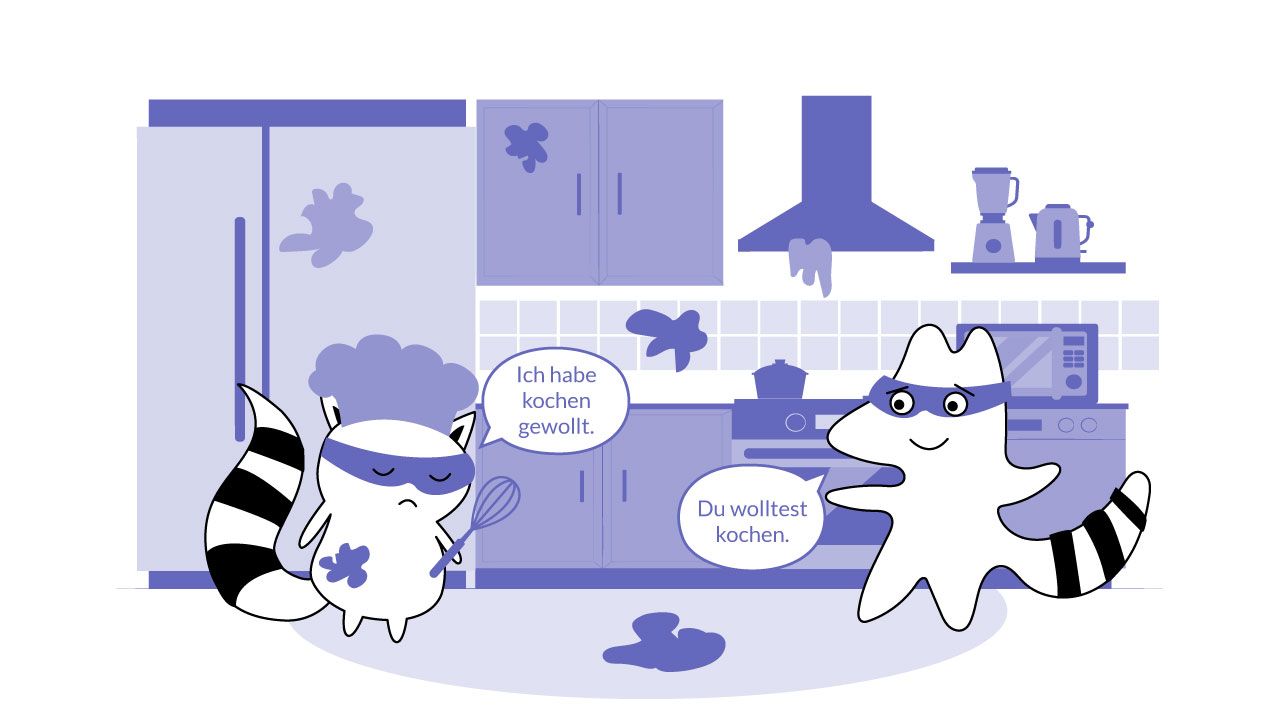
What About the Future Tense?
To express thoughts, obligation, necessity, or ability in the future, you can put the modal verbs in the future tense with the verb "werden." Usually, the German future tense is built of "werden" and an infinitive.
As you usually have two verbs in a sentence with a modal verb, you just do the same thing we mentioned for phrases with two modal verbs - you have two infinitives in one sentence. So, let's say the modal phrase you want to put in future tense is the following:
German
English
Ich kann Deutsch sprechen.
I am able to speak German.
The correct phrase will look like that:
German
English
Ich werde Deutsch sprechen können.
I will be able to speak German.
As you see, the phrase in the future tense has the auxiliary verb "werden" and at the end of the sentence two infinitives. The infinitive of the modal verb always comes at the very end of the phrase, behind the other verb.
Final Thoughts
Now that you know how to use a modal verb, German learning should be a breeze. You can express your needs, desires, and obligations, at least in the present tense, which is a significant step forward in your German learning process.
When you practice the past forms of the modal verbs, you will have many options for talking about your past in German. However, choosing the right practice tools is the key.
For example, you can work with a language learning app, such as the Langster app. There, you can see how native speakers use modal verbs in German by reading and listening to interesting short stories, while also learning new information about various topics. Give it a shot, and "Du kannst jetzt anfangen!" (You can begin right now!)






